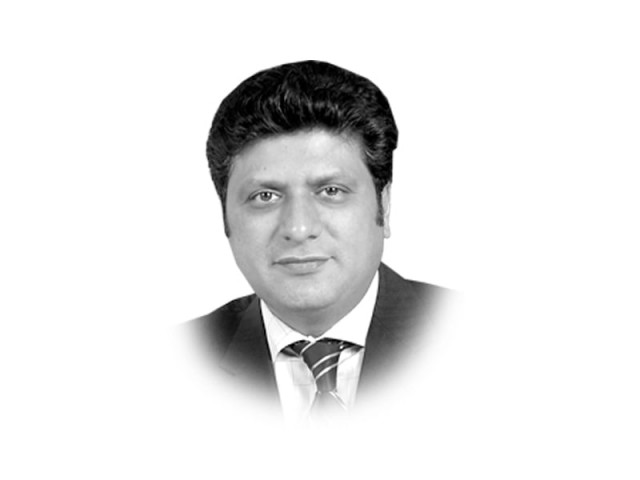Using big data for big decisions
Whether floods, earthquake or conflict, NADRA’s biometric database was deployed to identify affected citizens.

The writer is a former chairman of the National Database and Registration Authority
When the British ruled India, they compiled and presented local information through district gazetteers. The gazetteers served as a critical resource for governance during the British era. Such information gathering and processing has weakened after independence. The Pakistani state collects vast amounts of information through its myriad agencies, but these databases remain fragmented across departments. The absence of consolidated databases remains a weak link in the decision-making chain. Periodic national censuses, without which the business of government remains incomplete, are perpetually delayed.
In this milieu, the management of alternative databases assumes greater significance. When I resigned from NADRA, the organisation was spearheading several governance initiatives, ranging from the delivery of ID cards to the cleansing of the electoral process. Before leaving office, I had set three important targets for 2014. As the new management and the NADRA Board take over, it is hoped that there is some continuity of these objectives. We had identified at least three areas of strategic importance. First, the issuance of smart identity cards for all new identity card applications, phasing out the less secure teslin-based cards and introducing wider services for public benefit. Second, the expansion of our global footprint to ensure continued profitability. And, finally, our ongoing efforts towards delivering technology for good governance.
NADRA’s database can be combined with the Poverty Scorecard data to roll out smart identity cards that entitle their holders to subsidy and social protection payments. This can additionally open numerous possibilities for broader services in the fields of education, healthcare, insurance and financial inclusion. Using this platform, the government has an opportunity to strike a direct relationship with ordinary people in a transparent manner that bypasses intermediaries. In other words, these new uses of big data are critical if Pakistan is to be turned into a welfare state.
NADRA’s experience has shown that a disaster could be converted into an opportunity. Whether it was floods, earthquake or conflict, NADRA’s biometric database was skilfully deployed to identify affected citizens and to design efficient cash disbursement mechanisms for immediate relief. However, in the wake of the Balochistan earthquake last year, the government failed to efficiently use NADRA’s expertise. I kept running from pillar to post to convince officials that we have a successful template ready to roll out. We had already implemented it successfully for previous natural disasters. There was a lukewarm response, however, to the official summaries I moved to relevant departments. Today, we have already forgotten the victims of the Awaran tragedy. While our government was unconvinced about NADRA’s capability, the United Nations had appreciated our disaster relief initiatives and had requested us to deploy these tools in Africa. I hope that NADRA will continue to strengthen its role in providing social protection to deserving citizens and in managing disaster relief efforts.
Another area of strength that deserves continued support is the expansion of NADRA’s international portfolio. We have delivered large scale systems to Bangladesh, Sudan, Nigeria and Kenya, and have recently won a strategically important project in Sri Lanka. We were actively pursuing additional projects, which included subsequent phases of the Sri Lanka project, the Kenyan ID card project, and new opportunities in North Africa, Central Asia, Iraq and the Far East. Apart from earning much-needed foreign exchange and ensuring NADRA’s profitability, these projects support its strategic international profile. NADRA is currently among the top 50 system integrators in the ID management regime.
Besides its global presence, NADRA’s unique experience in the automation of manual business processes and enterprise system development in public organisations was a proven success. Such automation can transform public organisations by building their capacity and improving service delivery. NADRA’s database has been a particularly powerful resource for identifying tax evaders. Instead of nabbing these tax dodgers, vested interests in the government have instead started questioning the veracity of NADRA’s database. We were ready to challenge the claim but were never given an opportunity to clarify our position. I had a firm resolve to scrutinise each of the 3.6 million tax evaders and submit detailed information to the Federal Board of Revenue (FBR). A contract in this regard was duly submitted to the FBR, but is still awaiting approval. The rich are clearly well protected by every government.
Another use of big data that has invited the wrath of the powerful concerns the electoral domain. NADRA has played a historic role in cleansing and digitising error-free electoral rolls. It is now important to ensure continued support to election tribunals and superior courts for resolving election complaints. NADRA is obliged to technically assist these institutions without any fear or favour. In a thriving democracy, elections are not a past and closed transaction. If errors in the election process are not identified in time, the credibility of future elections can be at stake. I won’t be surprised if, in the run-up to the next elections, we are still debating how to facilitate overseas voting and electronic biometric verification. In a sense, we must begin the technical preparation for the next general elections now. Pakistan was created through the power of vote. It can be saved only by preserving the sanctity of the vote.
NADRA houses one of the world’s largest multi-biometric citizen databases, with massive fingerprint and digital photograph galleries run by world class Automated Fingerprints Identification and Facial Recognition Systems. This big data opens new opportunities as well as new challenges for change management. The real question, however, remains: Is the government ready to use big data for making big decisions?
Published in The Express Tribune, February 12th, 2014.
Like Opinion & Editorial on Facebook, follow @ETOpEd on Twitter to receive all updates on all our daily pieces.















COMMENTS
Comments are moderated and generally will be posted if they are on-topic and not abusive.
For more information, please see our Comments FAQ